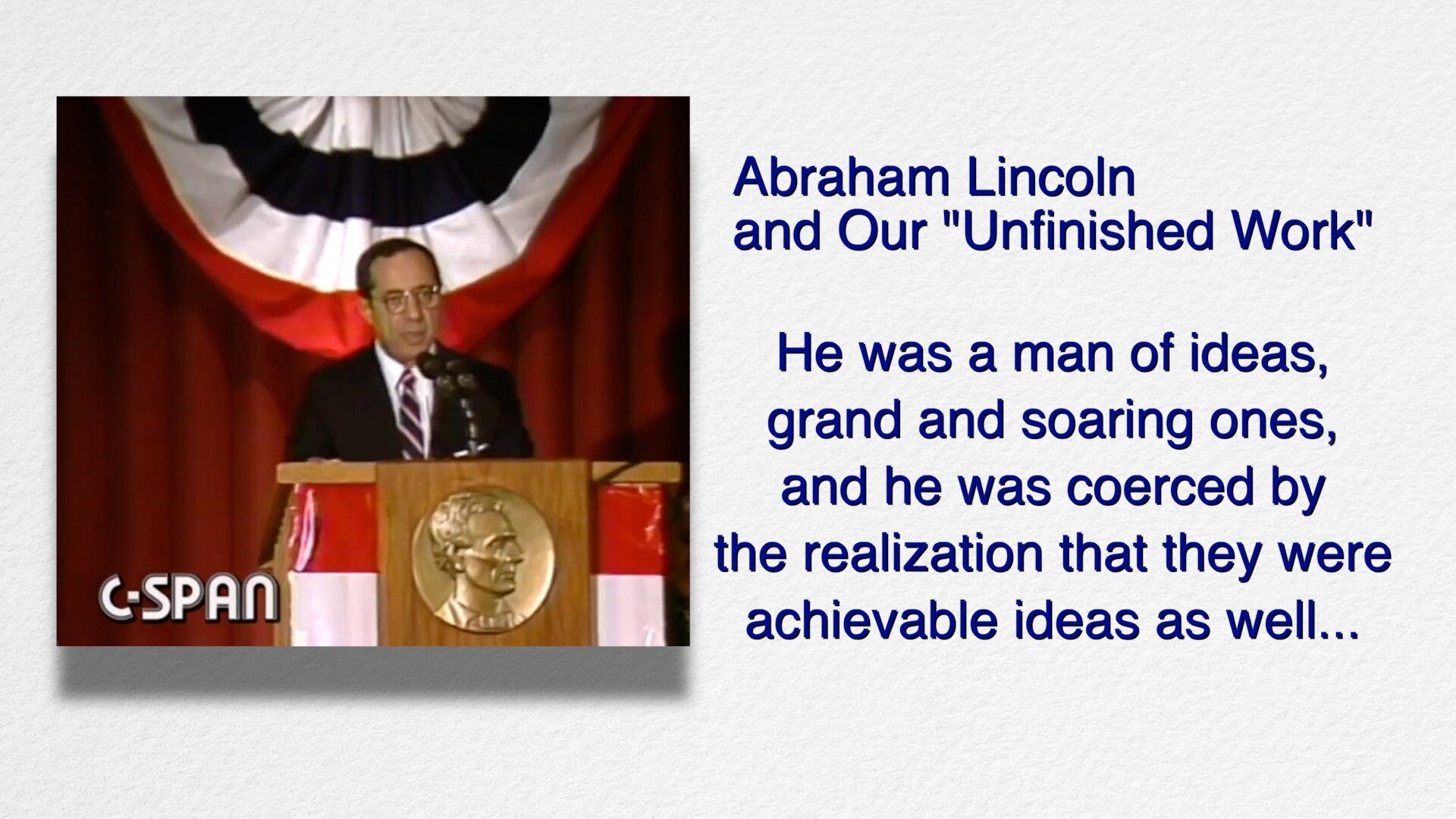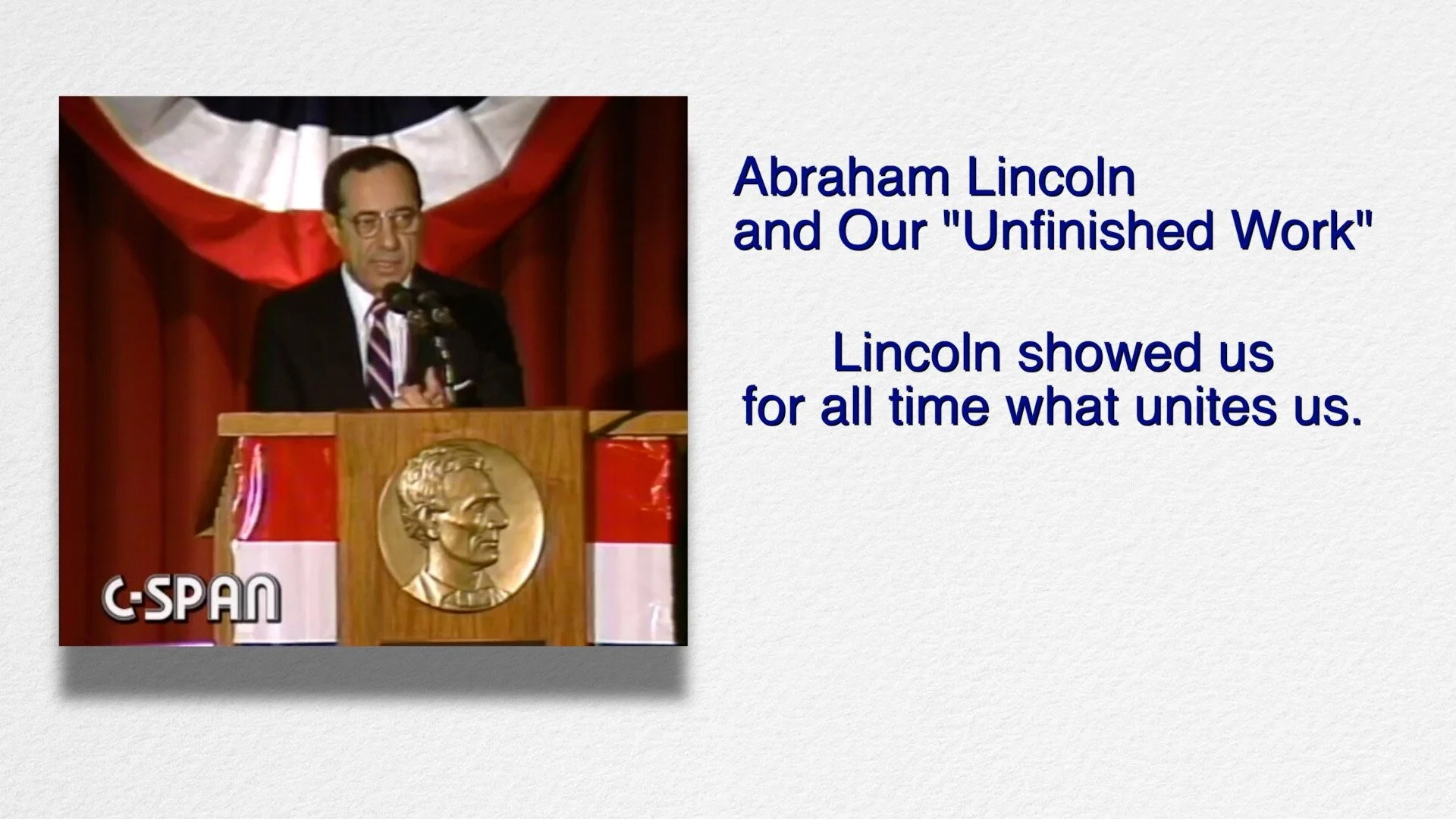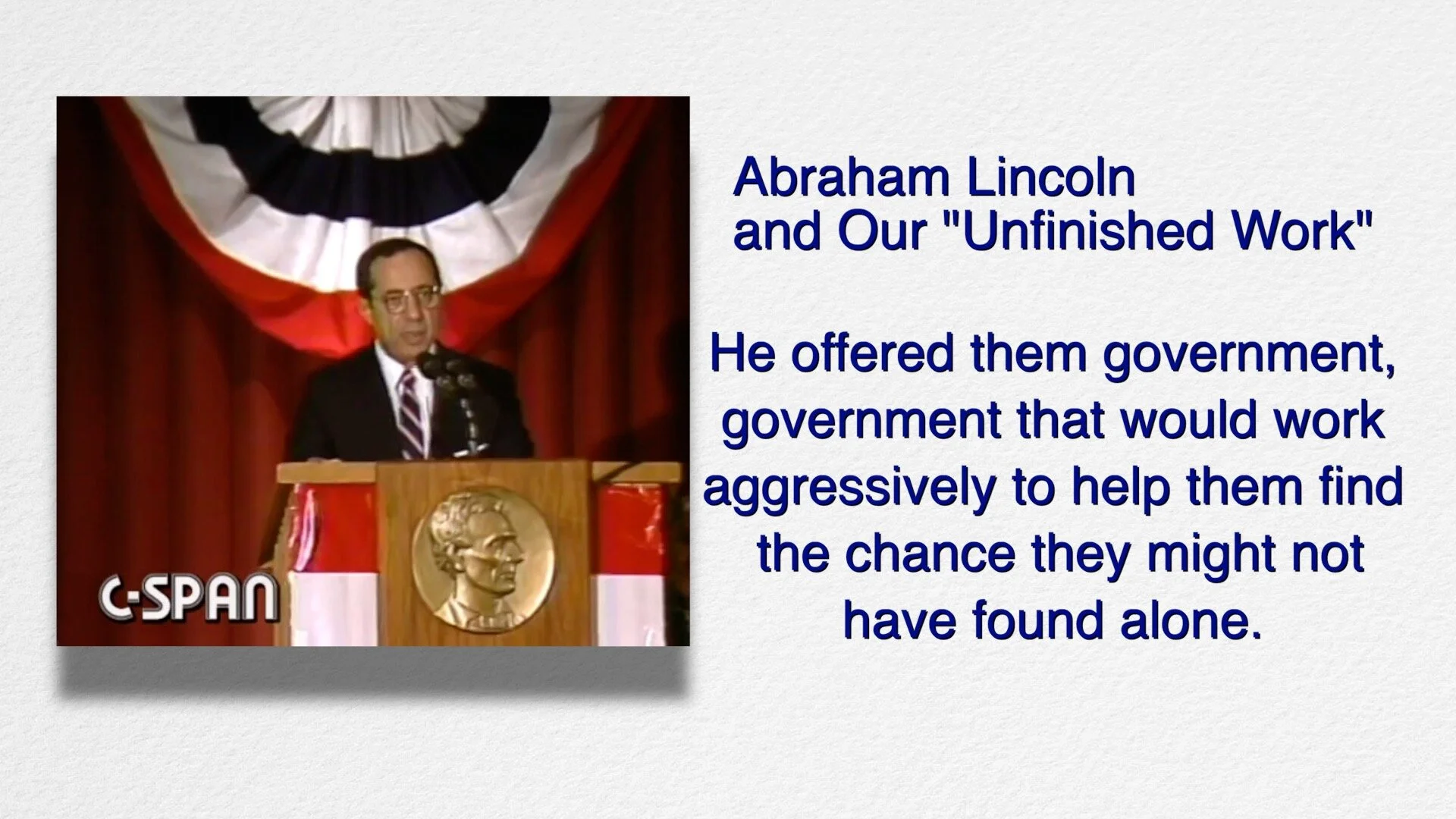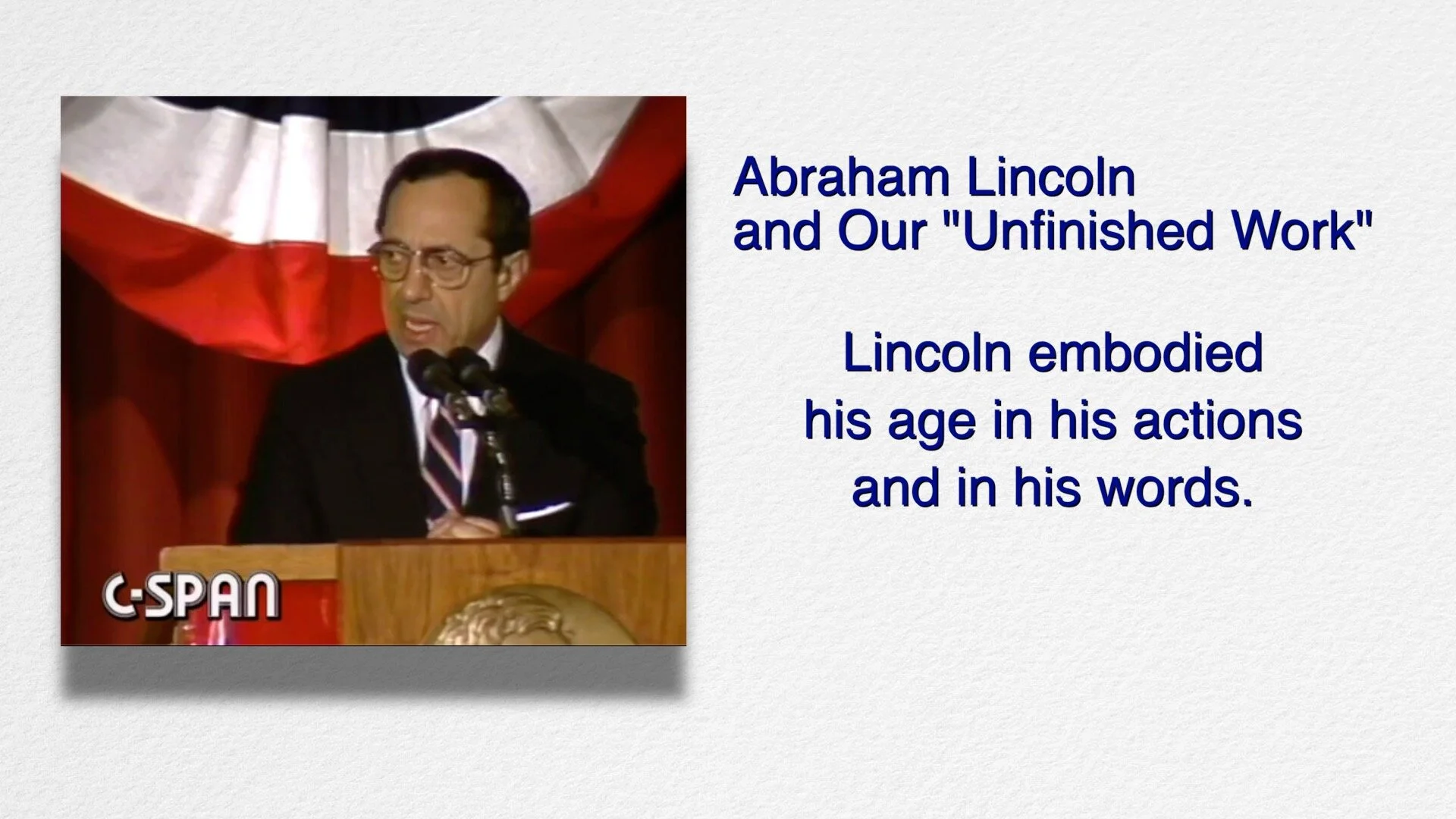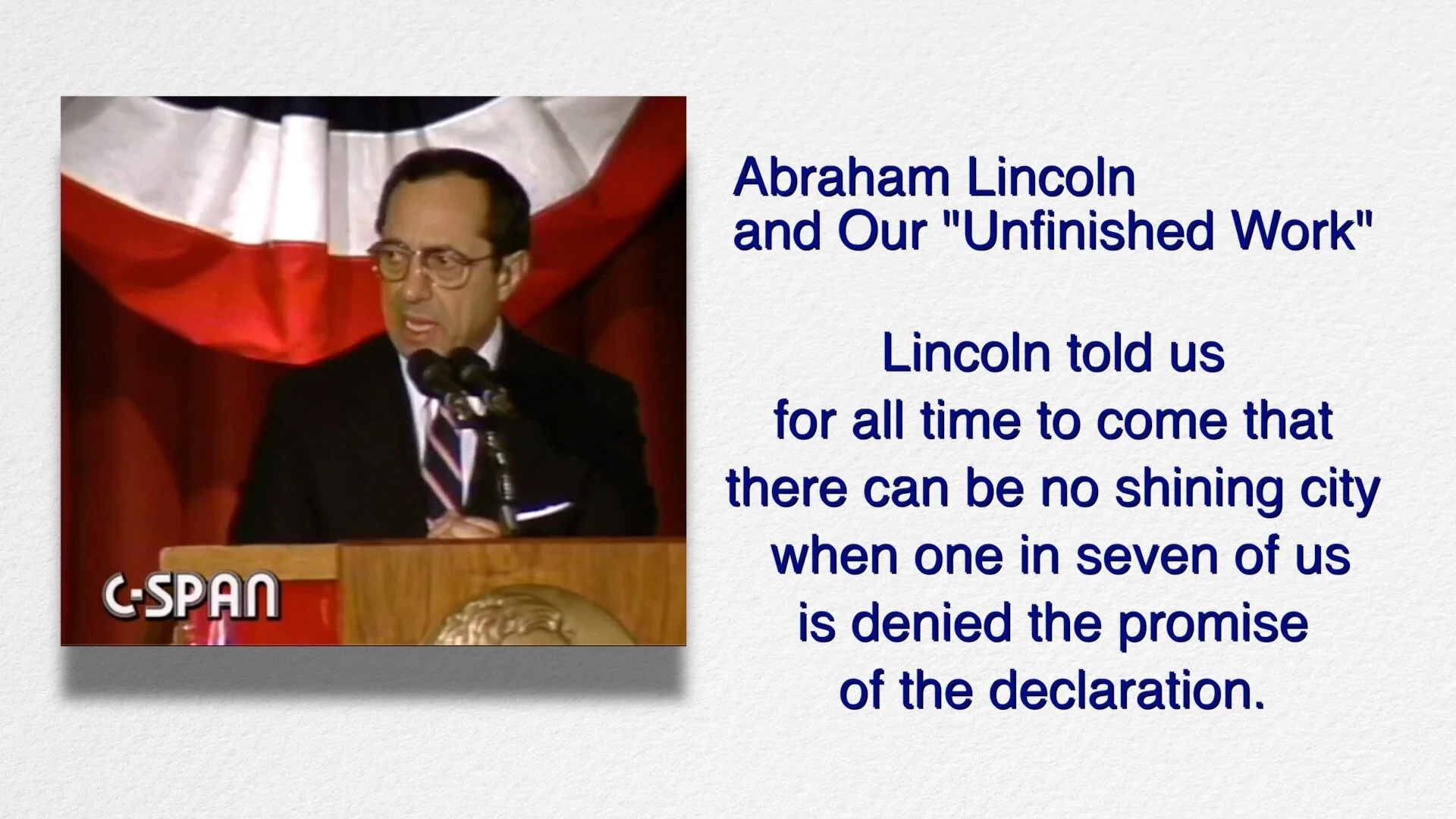On Abraham Lincoln
Click for Transcript
I've come to remember Lincoln as he was, the flesh and blood man, haunted by mortality in his waking and his dreaming life. The boy who had been uprooted from one frontier farm to another, across Kentucky and Indiana and Illinois by a father restless with his own dreams. To remember some of Lincoln's own words, which taken altogether, are the best words that America has ever produced. To remember the words that he spoke ten days after his lyrical, wrenching farewell to Springfield on his way to his inauguration as our 16th president. "Back in my childhood", he said then. "the earliest days of my being able to read, I got hold of a small book, Weems' Life of Washington. I remember all the accounts there given of the battlefields and struggles for the liberties of the country and the great hardships of that time fix themselves on my memory. I recollect thinking then, boy, even though I was, that there must have been something more than common that those men struggled for, and I am exceedingly anxious that the thing which they struggled for, that's something even more than national independence, that something that held out a promise to all the people of the world for all time to come shall be perpetuated in accordance with the original idea for which the struggle was made." Here was Lincoln, just before his inauguration, reminding us of the source of his strength and eventual greatness. His compelling need to understand the meaning of things and to commit to a course that was directed by reason, supported by principle, designed to achieve the greatest good. He was a man of ideas, grand and soaring ones, and he was cursed by the realization that they were achievable ideas as well, so that he could not escape the obligation of pursuing them despite the peril and the pain that pursuit would inevitably bring.
Click for Transcript
We did not learn quickly or easily that all men are created equal, one Lincoln scholar has observed. No, we did not learn those words quickly or easily. We are still struggling with them, in fact. As Lincoln did for a whole lifetime, from the time he read Weems' little book until the day he was martyred, he thought and planned and prayed to make the words of the declaration a way of life, equality and opportunity for all, but truly for all. Lincoln came to believe that the great promise of the founding fathers was one that had only begun to be realized with the founding fathers themselves. He understood that from the beginning it was a promise that would have to be fulfilled in degrees. Its embrace would have to be widened over the years. Step by step, sometimes painfully, until finally it included everyone. That was his dream. That was his vision. And that was his mission. And whether he defined for himself and for us the soul of our unique experiment in government, the belief that the promise of the Declaration of Independence, the promise of equality and opportunity can not be considered kept until it includes everyone. And for him, that was the unifying principle of our democracy. Without it, we had no nation worth fighting for. And with it, we had no limit to the good that we might achieve. He spent the rest of his life trying to give the principal meaning. He consumed himself doing it.
He reaffirmed Jefferson's preference for the human interest and the human right. The principles of Jefferson, he said, are the definitions and axioms of free society. But Lincoln extended those instincts to new expressions of equality. And always he searched for ways to bring within the embrace of the new freedom, the new opportunity, all who had become Americans. Deeply, indeed, reverently grateful for the opportunity afforded him, he was pained by the idea that it should be denied others or limited. He believed that the human right was more than just the right to exist, to live free from oppression. He believed it included the right to achieve, to thrive. So he reached out for what he called the penniless beginner. He thought at the American promise that every poor man should be given his chance. He saw what others would or could not see, the immensity of the fundamental ideas of freedom and self-determination that made his young nation such a radically new adventure in government. But he was not intimidated by that immensity. He was willing to use the ideas as well as to admire them, to mold them, so as to apply them to new circumstances, to wield them as instruments of justice, and not just echoes of it. And some in his time said government should do no more than protect its people from insurrection and foreign invasion and spend the rest of its time dispassionately observing the way its people played out the cards that fate had dealt them. He scorn that view. He called it a do nothing abdication of responsibility by government.
Click for Transcript
And over this time, many battles have been won and the embrace of our unity has been gradually but inexorably expanded. But Lincoln's work is not yet done. A century after Lincoln preached his answer of equality and mutual respect, some discrimination, some little discrimination of class or race or sex or ethnicity as a bard of full participation in America. They still remain. Certainly unpleasant reminders of less enlightened times linger. Sometimes they're heard in whispers, at other times loud enough to capture the attention of the American people. I've had my own encounter with this question and I've spoken of it. Like millions of others, I'm privileged to be a first generation American. My mother and father came to this country more than 60 years ago with nothing but their hopes. Without education or skills or wealth. And through the opportunity given them here to lift themselves through hard work, they were able to raise a family. My mother has lived to see her youngest child become chief executive of one of the greatest states in the greatest nation, in the only world we know. Like millions of other children of immigrants, I know the strength that immigrants can bring. I know the richness of a society that allows us a whole new culture without requiring us to surrender the one our parents were born to. I know the miraculous power of this place that helps people rise up from poverty to security and even affluence in the course of a single lifetime with generations of other children of the immigrants. I know about equality and opportunity and unity in a special way. And I know how from time to time all this beauty can be challenged by the misguided children of the know nothings, by the short sighted and the unkind, by contempt that masks itself as humor, by all the casual or conscious bigotry that must keep the American people vigilant. We heard such voices again recently saying things like Italians are not politically popular. Catholics will have a problem. He has an ethnic problem.
Click for Transcript
Had Lincoln not existed. Or had he been less than he was in the battle to keep the nation together, had been lost, it would have meant the end of the American experiment. Secession would have bred secession, reducing us into smaller and smaller fragments until finally we were just the broken pieces of the dream. Lincoln saved us from that. But winning the Great War for Unity did not preserve us from the need to fight further battles in the struggle to balance our diversity with our harmony, to keep the pieces of the mosaic intact, even while making room for new pieces. And that work is today, as it was in 1863, still an unfinished work, still a cause that requires a full measure of devotion. For more than 100 years, the fight to include has continued, in the struggle to free working people from the oppression of a ruthless economic system that saw women and children worked to death and more men born to poverty, live in poverty and die in poverty, in spite of working all the while. In the continuing fight for civil rights, making Lincoln's promise real, in the effort to keep the farmer alive, in the ongoing resistance to preserve religious freedom from the arrogance of the know nothing and the zealotry of those who would make their religion the states' religion. In the crusade to make women equal, legally and practically.
Click for Transcript
In his time, Lincoln saw that as long as one in every seven Americans was enslaved, our identity as a people was hostage to that enslavement. He faced that injustice. He fought it. He gave his life to see it righted. Time and again, since then, we've had to face challenges that threaten to divide us. And time and time again, we've conquered them. We've reached out hesitantly sometimes, but always we've reached out to include impoverished immigrants, the farmer and the factory worker, women and the disabled. To all those whose only assets were their great expectations, America found ways to meet those expectations and to create new ones. Generations of hard working people moved into the middle class and beyond because of America. We created a society as open and free as any on earth, and we did it Lincoln's way, by founding that society on a belief in the boundless enterprise of the American people. Always we have extended the promise, moving toward the light, toward our declared purpose as a people, to form a more perfect union. To overcome all that divides us because we believe the ancient wisdom that Lincoln believed, a house divided against itself cannot stand. Step by step, our embrace grows wider. The old bigotries seem to be dying, the old stereotypes and hatreds that denied so many their full share of an America they helped build have gradually given way to acceptance and fairness and civility. But still, great challenges remain. Suddenly, ominously, a new one has emerged. In Lincoln's time, one of every seven Americans was a slave. Today, for all of our affluence and might, despite what every day is described as our continuing economic recovery. Nearly one in every seven Americans lives in poverty, not in chains, because Lincoln saved us from that, but trapped in a cycle of despair that is its own enslavement. Today, while so many of us do so well, one of every two minority children is born poor. Many of them to be oppressed for a lifetime by inadequate education and the suffocating influence of broken families and social disorientation. Our identity as a people is hostage to the grim facts of more than 33 million Americans for whom equality and opportunity is not yet an attainable reality, but only an illusion.
Click for Transcript
You will rise or fall on your merits as a person and the quality of your work and all else is distraction. Lincoln believed with every fiber of his being, that this place, America, could offer a dream to all mankind different than any other in the annals of history. More generous, more compassionate, more inclusive. No one knew better than Lincoln our sturdiness, the ability of most of us to make it on our own, given the chance. But at the same time, no one knew better than Lincoln,the idea of family. The idea that unless we helped one another, there was some who would never make it. One person climbs the ladder of personal ambition, reaches his dream, and then turns and pulls the ladder up. Another reaches the place he has sought turns and reaches down for the person behind him. With Lincoln, it was that process of turning and reaching down that commitment to keep lifting people up the ladder, which defined the American character, stamping us forever with a mission that reached even beyond our borders to embrace the entire world. Lincoln's belief in America and the American people was broader and deeper, more daring than any other persons of his age and perhaps ours too.
Click for Transcript
No, we've not learned quickly or easily that the dream of America endures only so long as we keep faith with the struggle to include. But Lincoln, through his words and his works, has etched that message forever into our consciousness. Lincoln showed us for all time what unites us. He taught us that we cannot rest until the promise of equality and opportunity embraces every region, every race, every religion, every nationality and every class until it includes the penniless beginner and the poor man seeking his chance.
Click for Transcript
And so he offered the poor more than freedom and the encouragement of his own good example. He offered them government, government that would work aggressively to help them find the chance they might not have found alone. He did it by fighting for bridges and railroad construction and other such projects that others decried as excessive government. He gave help for education, help for agriculture, land for the rural families struggling for a start. And always at the heart of his struggle and his yearning was the passion to make room for the outsider. The insistence upon a commitment to respect the idea of equality by fighting for inclusion. Early in his career, he spoke out for women's suffrage. His contempt for the do nothings was equaled by his disdain for the know nothings. America, of course, beckoned foreigners, but many Americans, organized around the crude selfishness of the nativist movement, rejected foreigners. The nativists sought to create two classes of people, the old stock Americans and the intruders from other places, keeping the intruders forever strangers in a strange land. Lincoln shamed them with his understanding and his strength. "I am not a know nothing", he said. "How could I be? How can anyone who abhors the oppression of Negroes be in favor of degrading classes of white people? As a nation, we began by declaring all men are created equal. We now practically read it, all men are created equal except Negroes. When the know nothings get control, it will read all men are created equal except Negroes and Catholics and foreigners." And then he added. "When it comes to this, I shall prefer emigrating to some country where they make no pretense of loving liberty, to Russia, for instance, where despotism can be taken pure and without the base alloy of hypocrisy."
Click for Transcript
Lincoln embodied his age in his actions and in his words. Words. Even in measured hurrying across three decades, calling us to our destiny. Words that he prayed and troubled over more than a million words in his speeches and writings. Words that chronicle the search for his own identity as he searched for a nation's identity. Words that were by turns as chilling as the night sky and as assuring as home. Words, his reason sharpened into steel and his heart softened into an embrace. Words filled with all the longings of his soul and of his century. Words wrung from his private struggles spun to capture the struggle of a nation. Words out of his own pain to heal that struggle. Words of retribution, but never of revenge. Words that judged, but never condemned. Words that pleaded, cajoled for the one belief that the promise must be kept. That the dream must endure and grow until it embraces every one. Words ringing down into the present, all the hope and the pain of that epic, caught somehow by his magic cadences, the tearing away, the binding together, the leaving behind, the reaching beyond. As individuals, as a people, we're still reaching up. For a better job, a better education, a better society. Even for the stars. Just as Lincoln did.
Click for Transcript
He said look, the whole world is looking at us. There have been attempts at democracy before. Never one like this, never one with the potential success of this one. And this now is the big test to see if we can govern ourselves or whether the first time you have a really passionate disagreement amongst yourselves, you're going break up balkanize a word he wouldn't have used, but I do. And that was that was his feeling. And I think he's right. And I think he made the right judgment. And that was to pay the price to keep the union together.
Click for Transcript
Lincoln told us for a lifetime. And Lincoln told us for all time to come that there can be no shining city when one in seven of us is denied the promise of the declaration. He tells us today that we are justly proud of all that we have accomplished, but that for all of our progress, for all of our achievement, for all that so properly makes us proud, we have no right to rest content, nor justification for turning from the effort out of fear or lack of confidence. We have met greater challenges with fewer resources. We have faced greater perils with fewer friends. It would be a desecration of our belief and an act of ingratitude for the good fortune that we have had to end the struggle for inclusion because it's over for some of us.
Click for Transcript
To me, the thing that I was totally dazzled by was his extreme intelligence, his incredible ability to analyze his suppleness with the law and his big ideas, where a man who never stepped out of the country except to go to Canada in New York say we don't count the Canadian border as foreign policy. But that was the only time he ever left the country. But he kept he talked constantly about the rest of the world and the effect of the American experiment on the rest of the world. Poor fellow only went to school for a year. Total formal schooling. You know, his his sense of of the big, big truths in the world, especially and this is particularly relevant, I think, now, especially on the religious issues. He talked a lot about religion, where we're confronted now by very big religious issues, abortion, stem cells with religious predicates and his thinking about the fundamental truths, the basic spiritual truths that every religion starts with. What is your relationship to other human beings? How do you regard other human beings? And what do you do if you conclude that while you're supposed to respect them, love them, if you will, and work with them on what is your mission? Well, Hebrews say the mission is tikkun olam. Repair the universe. Christians say be collaborators in creation. He wasn't a Christian. He wasn't a Jew. But he said exactly the same thing. Your whole mission is to try to make this place better, make this living experience better. That's wonderful stuff. We don't have anybody who talks that way now.
Click for Transcript
Don't, don't try to make him a Republican in today's terms or a Democrat in today's terms. As a matter of fact, don't besmirch him with any of the modern labels. The old ones were bad enough. Because the modern labels are an absolute joke. What would you call President Clinton, a conservative? no-no-no liberal? No, no, no. He wouldn't like that. Well, then what do you call him? And if the word conservative meant anything, why would George Bush have to come from Texas, where he was a conservative and suddenly become a "compassionate conservative"? And if Democrat, made anything, meant anything, why would you have to run as a "new Democrat"? Why would you need those mitigating mockup words attached to the label if the label told you about the candidate? So the labels don't mean anything. And they didn't mean much in his time. He was a whig, who became a Republican. I say you shouldn't try to label him. He's too supple for that. And if you absolutely forced me to give you a label, because only had two words to describe him. I'd say, well, call him progressive and call him pragmatic and make him a pragmatic progressive or a progressive pragmatist. Because he was broader than that, he was more, here's a good example, I think, of that. Right now we have an argument about who are the conservatives? Who are the liberals? You'd probably have to start it by saying, OK, what did they say about the role of government? And the conservatives would say, as Reagan did and as Clinton did at one point, the era of big government should be over. Big government is the problem. Little government is what we believe in. And then you'd go to liberals and they'd say, well, no, we need more government. You go to Lincoln and what does he say? He doesn't fall into that foolish trap. He doesn't play that simplistic game. He said, look, it's it's it's basic. The Constitution brought us together. Government is the coming together of people to do for one another collectively what they could not do as well or at all privately. And so if you can use the market system, use the market system. Don't bother with us. If you could build all the roads we need in this country, don't ask Eisenhower to do the road program. Just build them and make them toll roads like Europe. If you could educate everybody in this country through the market system, well, then I. Lincoln wouldn't have wasted my time saying one of the first things we have to do is education. And for your information, neither would Adam Smith have done it in the Wealth of Nations. When he says look, market systems are inevitable if you're going to have a good society, but they're not sufficient by themselves, there have to be interventions. And he named specifically education. So, Lincoln didn't read The Wealth of Nations. Maybe did. I don't see any evidence, but he didn't need to. He was as smart as Smith was, only he said it better. And if you take that test and apply it to everything, you end this argument about the role of government. It gets to be very easy because then you're arguing ad hoc. Space program, Kennedy wants one, oh conservatives.? You want to leave it to the private and maybe Boeing will do it. I don't think so. How about government? Yeah, it's a good investment. And so we're in it. And on and on and on. With Lincoln, it was internal improvements. We're talking about a bank. We need a bank. With Hamilton, it was the National Bank, etc., etc.. But that's always a correct analysis. All through it. When it got to Roosevelt and and poor people were dying because nobody was there to help them and old people who were sick had no help. Roosevelt said, look, we have to make a change in this democracy. There are a lot of things the market is not doing for us beyond public schools, and that's healthcare and and work for people or help for people who are out of work and retirement benefits. So you do Social Security, unemployment insurance, workers benefits of all kinds. And then later, Johnson does Medicare and Medicaid. And this is Lincoln. And if you had paid attention to Lincoln in the early stages and didn't make these simplistic arguments about government is bad, government is good, it's neither. It's necessary. And when it's necessary, you use it. When it's not, you don't. We could use that talk today from Lincoln.
Click for Transcript
In page 166 in the book, I do a state of the state, a State of the Union by Lincoln today in Lincoln s language and in Harold Holder, who worked as an aide who everybody knows is a great Lincoln scholar, an old friend of mine, Harry Harold holds, or who I first gave the I said, Harold, I'm going to write this him and write it tonight. And he said, she will. It is. How could you ever get away with that? Well, let let me try it. Just trying to do his language and today's issues, Iraq, terrorism, the huge tax cut, et cetera. And I did it. And Harold, call me up and he said, you know, son of a gun. I think I think we can make this work. And I said, now go through second inaugural and the other places pluck out sentences for me that are actual Lincoln sentences that fit this speech that that I've written. And we did that and worked on it. And so that's that's an idea of Lincoln speaking today. I think he'd have to change some of his syntax and some of his grammar. But but we need him desperately. That's why I wrote the book. I think what he said, what he believed, the big ideas he offered you, the wisdom he offers you. We need desperately now. We're confused where riveted on terrorism and war, which we need to be while still losing men and women and other innocent people are dying as well. And sure, we have to think about it, but we have to be thinking about that and much more. He thought about the civil war. He thought about each battle, but he thought constantly about much more than that. He thought about what was going to happen when he finally did win the war and how he was going to reconcile and how he was going to make us one again and how he was going to preserve us for the benefit of the entire world. That's his mind. That's what we need now.
Full Remarks
Articles
Mario Cuomo On Lincoln And Equality by Mario Cuomo
